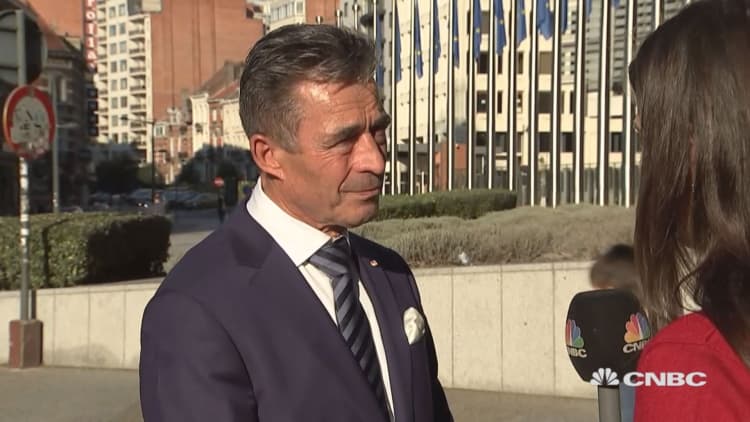WASHINGTON — Secretary of State Mike Pompeo announced Tuesday that the United States is prepared to withdraw from a crucial weapons treaty signed by the world's two biggest nuclear powers.
Pompeo offered Russia an ultimatum: come into compliance in 60 days or the United States will leave the Intermediate-Range Nuclear Forces, or INF, Treaty.
Russia, Pompeo said, has developed "multiple battalions of the SSC-8 missiles," a move that falls outside of the Cold War-era arms agreement.
"Its range makes it a direct menace to Europe," he said after a meeting with his NATO counterparts.
"Russia's violation of the INF Treaty erodes the foundations of effective arms control and undermines Allied security. This is part of Russia's broader pattern of behavior that is intended to weaken the overall Euro-Atlantic security architecture," wrote NATO foreign ministers in a joint statement.
"We call on Russia to return urgently to full and verifiable compliance. It is now up to Russia to preserve the INF Treaty."
The INF treaty, signed in 1987 between President Ronald Reagan and Soviet leader Mikhail Gorbachev, prohibited the development and deployment of midrange nuclear-tipped missiles. The agreement forced each country to dismantle more than 2,500 missiles with ranges of 310 miles to 3,420 miles from their arsenals.
In short, the treaty has kept nuclear-tipped missiles off the European continent for the last 30 years.
Some observers said the administration was on the right track. "After 10 years of violations and four years of being called out by the United States, the announcement is justified, measured and timely," said Thomas Karako, director of the Missile Defense Project at the Center for Strategic and International Studies.
But others said more needs to be done to salvage the treaty. "Expressing hope, as Pompeo did, that Russia will return to compliance with the INF Treaty in 60 days is not a strategy," Kingston Reif, director of disarmament research at the Arms Control Association, told CNBC.

"Diplomatic options to resolve the treaty crisis have not been exhausted. If the United States, its allies, and Russia are serious about saving the treaty, then the time between now and February must be used productively in pursuit of a solution that acknowledges and addresses the concerns of Washington and Moscow."
Last month, Trump threatened to withdraw from the INF Treaty, an agreement that eliminated an entire class of nuclear weapons from U.S. and Russian arsenals.
Russia, Trump said, has violated the arms agreement by building and fielding the banned weapons "for many years." On behalf of the administration, national security advisor John Bolton flew to Moscow to personally deliver the decision to the Kremlin.
"It is the American position that Russia is in violation," Bolton told reporters after a meeting with Russian President Vladimir Putin last month. "It is Russia's position that they are not in violation. So one has to ask, 'How do you convince the Russians to come back into compliance with obligations they don't think they're violating?'"
When asked, the Pentagon said Defense Secretary James Mattis is "completely aligned" with Trump's abrupt announcement to withdraw from the treaty.
"The secretary of Defense has consistently said that Russia has not been in compliance with the treaty," Pentagon spokesman U.S. Army Col. Rob Manning said. "The secretary is completely aligned with the president, and he is in close contact with the president on this."


